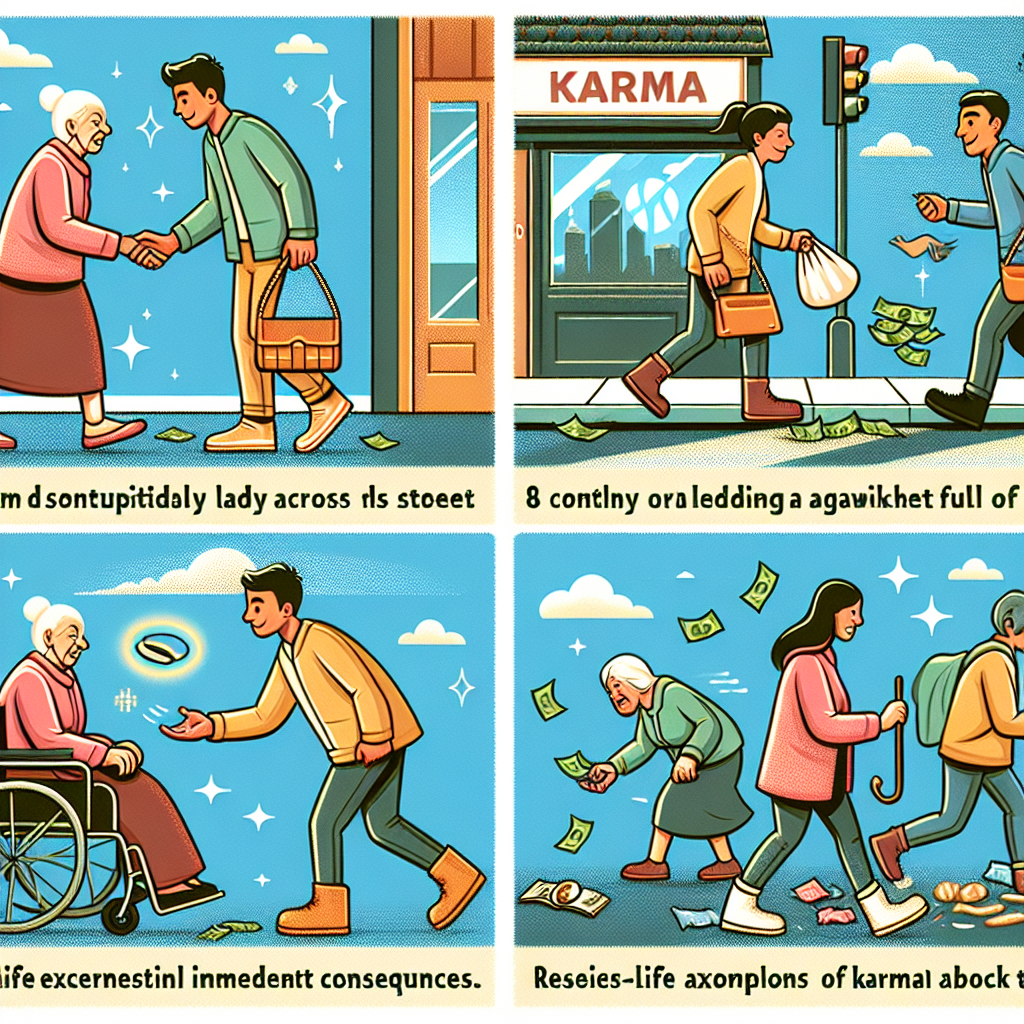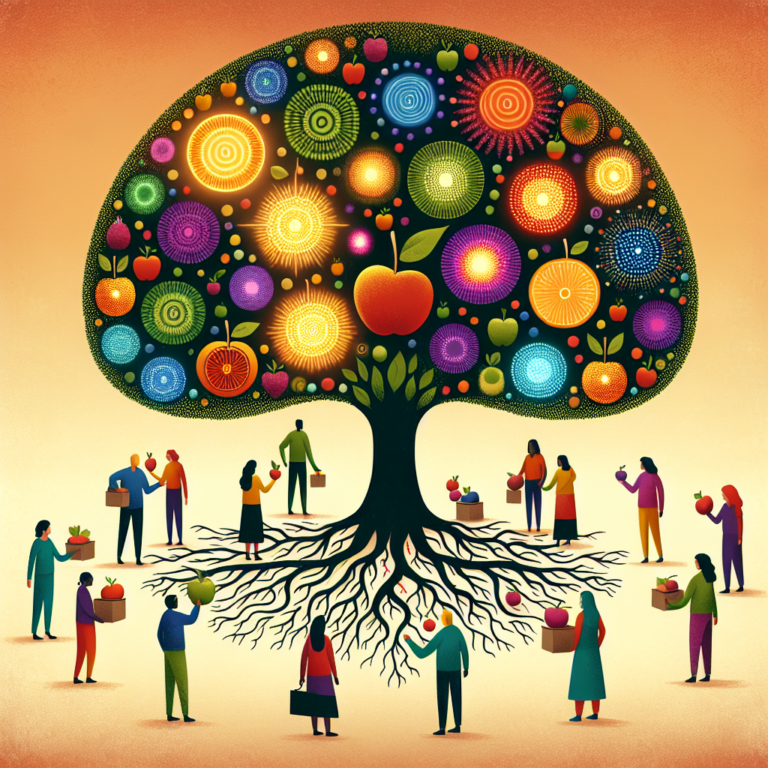Real-Life Examples of Karma in Action
Karma is often understood as the law of cause and effect, a core principle in various religious traditions, especially those stemming from Hinduism and Buddhism. It posits that every action has consequences that eventually return to the originator, whether immediate or delayed. The notion has permeated into Western culture, influencing a wide range of philosophical discussions, moral teachings, and popular culture references.
In this article, we will explore real-life examples of karma in action, illustrating this powerful concept through personal stories, historical events, and even tales from popular culture. We’ll delve into how karma manifests in everyday life as well as those moments when it seems to rise to a larger societal or historical level.
Understanding Karma
Before we dive into the examples, it is vital to clarify what karma really means. At its core, karma arises from the Sanskrit word "karman," which means "action" or "deed." The foundational idea is that good actions lead to positive outcomes, while harmful actions result in negative consequences.
Most people think of karma in terms of justice — the idea that wrongdoers will eventually face repercussions. Yet, karma is also about the broader cosmic balance, where one’s intentions and actions shape not only their fate but the environment around them.
The First Example: The Story of Bill Gates
Bill Gates, co-founder of Microsoft, is often seen as a quintessential example of karma in action. Gates accumulated immense wealth through technological innovation, but what stands out increasingly in his life is his commitment to philanthropy through the Bill & Melinda Gates Foundation.
In the early 2000s, questions arose about the monopolistic practices of Microsoft. Many critics claimed Gates was exploiting his market position to eliminate competition. Fast forward a decade, Gates has turned much of his fortune toward charitable work, aiming to eradicate poverty and improve global healthcare.
One could argue that Gates’ shift towards philanthropy was a direct result of understanding the greater implications of his earlier business practices. In other words, his past actions (which were often viewed negatively) shaped his current path, motivating him to create positive change in the world. Through his dedication to giving back, Gates has seen a transformed public perception, illustrating that the essence of karma is ultimately about growth and learning from one’s actions.
The Second Example: The Unfortunate Fate of Bernie Madoff
Conversely, Bernie Madoff, an infamous financier, provides a sobering example of bad karma manifesting in real life. Madoff orchestrated one of the largest Ponzi schemes in history, defrauding investors of billions of dollars. His actions undeniably led to catastrophic effects on countless lives.
When Madoff’s fraudulent practices came to light in 2008, he was sentenced to 150 years in prison. The financial ruin he inflicted upon his investors served as a catalyst for suffering that echoed far beyond his own fate, impacting families, organizations, and entire communities.
Madoff’s story is a prime example of how negative karmic energy can accumulate. His generous lifestyle, built upon the misery of others, eventually unraveled, revealing the inescapable cycle of cause and effect.
The Third Example: The Ripple Effect of Kindness
Contrasting negative karma is the extraordinary impact of kindness in everyday interactions. A well-documented case involves a woman named Kelly who was going through a particularly rough patch when a stranger paid for her coffee at a café. This simple act of kindness uplifted her spirits.
Inspired by this random act, Kelly made it a habit to pay it forward, helping others in small but meaningful ways. The ripple effect of her kindness could be traced through cascading acts of generosity that ensued, all originating from one seemingly minor interaction.
In this instance, karma acted not merely as a linear chain of actions and reactions but as a web of interconnected choices that lifted an entire community. The butterfly effect of Kelly’s moment of gratitude illustrates that each positive action can create a wave of goodwill.
The Fourth Example: The Fall of Media Moguls
In the realm of media, the downfall of several prominent figures can be viewed through the lens of karma. Take, for instance, Roger Ailes, the former CEO of Fox News. Ailes was forced to resign amid numerous allegations of sexual harassment. The actions he took during his tenure, including alleged intimidation of employees and fostering a toxic workplace culture, ultimately led to consequences that engulfed his career and tarnished his reputation.
This phenomenon repeats itself among other media moguls who’ve faced similar fates, such as Harvey Weinstein, whose predatory behavior came to signify the broader #MeToo movement. The karmic consequences of their actions highlight that when individuals choose to harm others for personal gain, their misdeeds tend to surface, resulting in personal and professional losses.
The Fifth Example: The Repercussions of the Toxic Workplace
In various workplaces, the manifestation of karma often becomes apparent. A leader who exhibits toxicity and manipulates employees for personal gain may not notice the slow erosion of trust and morale in their team. Over time, this can culminate in high turnover rates, resulting in a significant loss of talent and productivity.
Conversely, leaders who uplift and promote a positive work environment cultivate loyalty in their teams. Organizations like Google are often hailed for their cultural values and practices that foster employee satisfaction and productivity. The karmic lesson here is that the environment one fosters plays a pivotal role in overall success.
The Sixth Example: The Tale of the Buddha
One of the foundational stories in Buddhist tradition is that of Siddhartha Gautama, who became the Buddha. His early life was marked by a sheltered existence within his family’s wealth and privilege. However, a chance encounter with suffering in the form of old age, sickness, and death forced him to confront the impermanence of life.
The karmic implications of his journey highlight that awareness of one’s own actions and the fate of others is crucial for spiritual growth. Upon attaining enlightenment, he dedicated his life to teaching others about suffering, compassion, and mindfulness.
In this narrative, karma transcends individual actions, becoming a path toward greater understanding and collective healing. The Buddha’s story serves as a reminder of how transforming one’s own karma can lead to the upliftment of many.
Frequently Asked Questions (FAQs)
What is karma?
Karma is often defined as the law of cause and effect, suggesting that our actions — whether good or bad — lead to corresponding outcomes in our lives. It is a concept frequently associated with Eastern philosophies such as Buddhism and Hinduism.
Does karma operate immediately?
Not necessarily. Karma can manifest in both short-term and long-term results. While some actions may yield immediate consequences, others may take time to become apparent.
Can good actions prevent bad karma?
Engaging in positive actions can certainly mitigate the negative consequences of past actions. However, karma is complex, and every action influences the path forward in unique ways.
Is karma a form of punishment?
Karma is not necessarily a form of punishment; it is more aimed at creating balance. It’s about learning, personal growth, and a response to the choices we make rather than inflicting punishment.
Does karma exist only in this lifetime?
Different spiritual beliefs hold varying views on karma. In some traditions, karma can carry over from one lifetime to another, impacting the experiences and circumstances in future lives.
How can I create good karma?
Creating good karma involves intentional acts of kindness, compassion, and honesty. Living with integrity and being mindful of your actions toward others can cultivate a positive karmic cycle.
Can I change my karma?
Yes! While we may inherit karmic patterns from past actions, we have the power to make conscious choices in the present that can redirect our karmic journey.
Why does bad things happen to good people?
Judging the fairness of life events based on the concept of karma can be complex. Sometimes, individuals are caught in a larger web of interconnected actions, and the outcomes may not align straightforwardly with one’s moral standing.
Conclusion
Karma, as a principle, encapsulates the complexity of human actions and their far-reaching implications, both for individuals and society. Whether in the form of personal experiences or grand historical narratives, the stories we examined illustrate the intricate dance between intention, action, and consequence.
Understanding karma invites us to navigate life with mindfulness and integrity, recognizing that our actions ultimately shape our experiences and the world around us. By acknowledging the power of our choices, we can work towards creating a more compassionate and equitable society, ultimately enriching our own lives and the lives of others.
real-life-examples-of-karma-in-action





